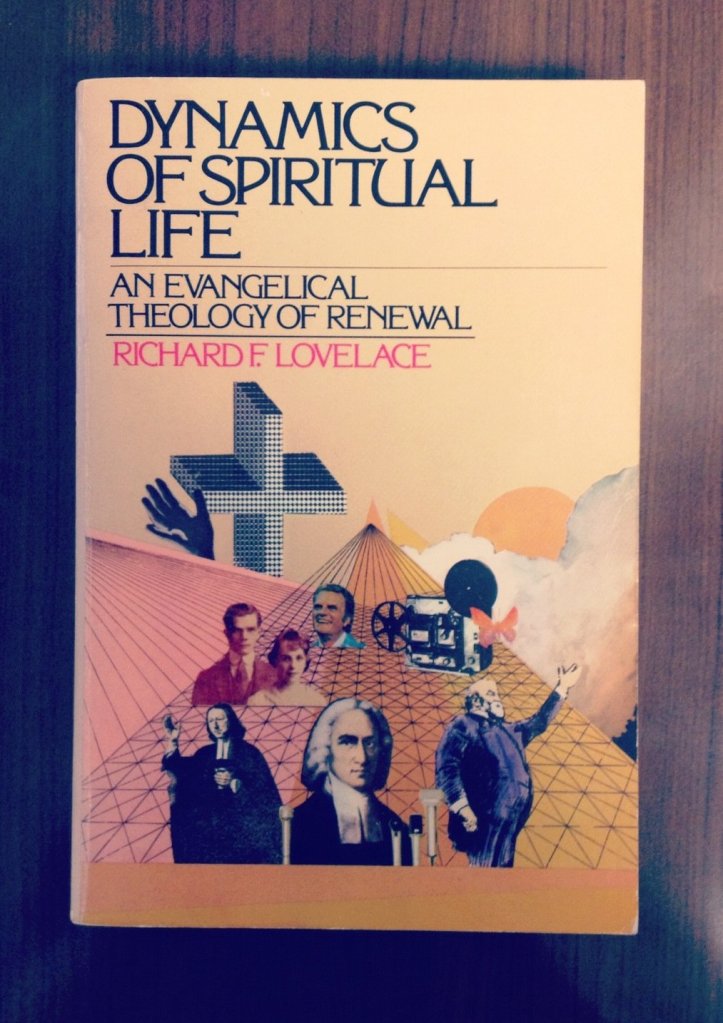It’s pink, grey and beige, with a broken spine and a hideous 1970’s cover. Its pages are covered with my scrawls and highlighting. But my copy of The Dynamics of Spiritual Life by Richard Lovelace(1) is a book I try to read every year.
I thought it was my little secret. Why had no-one read it? Why did it grip only me? If found the biblical and historical observations compelling, powerfully so. When God moves, does he leave clues?
And then I discovered a soul-mate – the great Tim Keller. He had read, marked, learned and inwardly digested this wonderful book, and it became a regular thread in his lectures and writing.
So what follows is nothing new. I may have got this from Keller or from Lovelace initially, but it has become so much a part of me that I will simply note my acknowledgements and press on.
Here’s the game. If we analyse remarkable seasons of life and health in a church or churches, what language shall we use, and how to we pray about them? Are revival and awakening the same thing?
What follows is inevitably arbitrary: there is no industry default on the definitive meaning of these terms. But I find it helpful to tease them out in my mind. We can find better words for all these things, and each one contains multiple elements. But it’s worth having each one on our prayer calendars as a discrete element.
To give a context on why I’m writing this now, I was recently at a London-wide meeting of pastors and ministry leaders across a forest of denominations, cultures and ethnicities, all desperate to proclaim Christ in our city. Around the tables there were stories of conversions, here and there but definite. Of young men and women who knew nothing, seeking Christ. And the pastor at the front said, “I hear the sound of rain. I hear the sound of rain”.
And someone asked, is multicultural London about to become the world’s first de-secularising city?
And someone asked, is multicultural London about to become the world’s first de-secularising city?
If revival were to come in our day and in your home town or mine, how would we know? What would mark it? How could we come it. How should we prepare for it? What can we do to get out the way?
If revival were to come in our day and in your home town or mine, how would we know? What would mark it? How could we come it. How should we prepare for it? What can we do to get out the way?
Here are five marks, overlapping circles maybe, but in a sequence.
Genuine conversion
We have to start here, and keep returning. Our base unit is the individual Christian, and calling each one to turn and follow Christ, must be in place.
Do some groupings think more in terms of household or group before personal? Sure – and in those cultures that needs to be addressed, but without allowing the idea of a ‘cultural christian’ creep in. Someone is a believer not because they are in a household with other believers, but because they are a believer.
As the evangelists say, God has many children, but no grandchildren.
Personal renewal
There are seasons in life when faith burns brighter, and others when the road is uphill and stony. That’s true for everyone.
But there are healthy practices which makes it more likely we burn brighter, even uphill.
There’s no secrets in any of this: prayer, fellowship, praise, giving, reading the Bible, sharing our faith in word and in action. It’s a simple recipe, but potent.
So my challenge as a pastor is twofold.
First, is to make sure that I am attending to those basic practices for myself. That my encounter with the bible isn’t just to feed others. That I have non-Christians Im praying for. You know the drill.
Second, is to make those practices as accessible as possible, for as many as possible. I call it ‘doable discipleship.’ Run seminars, preach sermons, produce resources, all with the intention of making it as simple and easy as possible.
My tendency is to keep the cookies one shelf too high. I leave people feeling that they ‘ought’ to do something without helping with the how, where, when. And that so something is not doable by a single parent pulled in five directions.
Can we make renewal happen? No. Perish the thought. It’s a sovereign wrk of God. But the means he has used through history are visible and valid.
Congregational revival
Suddenly, one Sunday, a pastor notices that people are paying more attention to the sermon, and it’s having a deeper impact. There are more tears and hugs around the place. More prayers, and more praises.
Has the preacher suddenly hit the sweet-spot with the message?
No, God is at work, way beyond the preacher’s control. God’s word is at work.
He is always, of course. But there seem to be seasons where people are unusually, intently responsive, as a body.
As Edwards famously put it, “There is very much to convince us, that God alone can bestow it, and show our entire and absolute dependence on him for it. The insufficiency of human abilities to bring to pass any such happy change in the world . . . does now remarkably appear.” (2)
Wider awakening
Edwards is famously instructive in his narrative of the movement of God during his ministry. He tracks how it waxes and wanes, and one feature is that God’s work sometimes happens in many churches, not just one, across an area not just one place.
It’s not that it spreads, but that it happens simultaneously and spontaneously.
As a pastor, I’m always to be alert to when other pastors seem to be experiencing the same, surprising thing. Trickles of converts from one people group, for instance. Or those we haven’t seen for a while coming back, and again. Is genuine conversion or personal renewal? Who cold know.
To repeat, this doesn’t happen through careful planning, or meticulous publicity. This is spontaneous, and should (will?) make us glad.
National reformation
And finally, there’s that rare occurrence when sufficient believers have sufficient cultural weight that the culture itself can change. Yes, that produces godly preachers and deep personal spiritual integrity. But it’s wider than churchy matters. The social changes of Wilberforce or Shaftesbury were built on these deep foundations too.
The priority of the prayer chain
Across history, different people and issues have threaded around these units of spiritual momentum. It might be a particular preacher, or book, or habit, or practice, or conference.
One thing they all seem to have in common though, is the intensity of prayer that precedes them. Again, to quote Edwards, “It is God’s will, through his wonderful grace, that the prayers of his saints should be one great and principal means of carrying on the designs of Christ’s kingdom in the world. When God has something very great to accomplish for his church, ‘tis his will that there should precede it the extraordinary prayers of his people.”[3]
So, that makes me look very hard at my prayer life, our prayer life, the local churches’ prayer life.
The disconnected pastor
It’s obvious that Edwards participated in these patterns of life, rather than being a mere reporter. He was engaged. That makes me look at any temptation in planning services, prepping sermons, which makes me an observer, disengaged, laying on prayer and praise for others to take part in while I get ready to present the next element in the service. Those temptations lie all around me, and I assume for you too – but Edwards would would rightly call us out for being technicians.
Three quick notes: I do know that Edward’s position on slave-ownership makes him problematic for many to learn from. Learning from the past is always marked by such issues, but this seems to be particularly egregious. If that is the case for you, know that I am only endorsing his statements of observation on revivals and awakenings; nothing more. No doubt others before him made similar observations, but he did so succinctly. And everyone after him seems to build on him, but with more words.
Second, many of Edwards’ observations occur in dialogue about what might happen, in the light of his wider view of eschatology. That view, typically intricate but autodidactic, is not one I share, but I don’t think that invalidates his narrower and more local observations.
Third if you’ve tried reading Edwards in the old Banner of Truth edition, it’s time to put it to one side. The Yale editions (many in paperback) are much more accessible and legible.
So there you go: five elements of remarkable works of God. What have I missed? What else should we pray for?
You know the drill – pile in!
- Richard F. Lovelace, Dynamics of Spiritual Life: An Evangelical Theology of Renewal (InterVarsity Press, 1980)
- Jonathan Edwards, A History of the Work of Redemption, ed. John F. Wilson, vol. 9 of The Works of Jonathan Edwards (New Haven: Yale University Press, 1989), 359.
- Jonathan Edwards, The Great Awakening, ed. C. C. Goen, vol. 4 of The Works of Jonathan Edwards (New Haven: Yale University Press, 2009), 516






I was at the London dinner also…an encouraging time. Revival is too big for one church or denomination to bring about. It requires unity across divisions. By nature we are tribal but Jesus calls us to humbly work with others (Mark 9:38-41) but not at the expense of the truth (John 17:20-21).